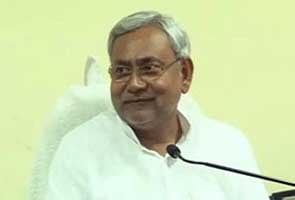
Patna/Rajkot:
Once again, it is Narendra Modi who has contributed a new stress-point to the relationship between his party and Nitish Kumar, who together form the government in Bihar.
Over the weekend, Mr Modi said at a rally in Gujarat that "festering caste politics" in Bihar is the main reason for what he calls the state's backwardness. "Bihar, at one point of time, was a political and spiritual leader of the country, but it slipped into socio-economical backwardness ever since casteist leadership took centrestage," he said. Mr Kumar retorted today that he doesn't need Mr Modi to preach to him. "He should first look at what he has done in Gujarat," he said, in an indirect reference to Gujarat's communal riots in 2002, which remain a major obstacle between Mr Modi and his ambitions for a national-level role with his party, the BJP.
Mr Kumar has repeatedly disassociated himself and his party, the Janata Dal (United) from Mr Modi. Though he partners with the BJP in Bihar, Mr Kumar refused to allow Mr Modi to campaign in his state for the last state elections in 2010 and the general elections in 2009. Mr Kumar's two successive terms in Bihar have been based partly on increasing loyalty from the state's considerable Muslim population. He does not want to risk his secular image through any association with Mr Modi. The Gujarat Chief Minister, meanwhile, has been smarting from Mr Kumar's repeated snubs.
Both ambitious leaders who have been feted for their achievements as administrators are also said to be rivals for that one slot - a future Prime Ministerial candidate of the National Democratic Alliance (NDA). They have baited each other often, publically, and make no bones about their differences. Mr Modi recently came in for criticism even from Mr Kumar's deputy, BJP leader Sushil Kumar Modi, for his insistence that long-time rival Sanjay Joshi be shunted out of the party.
Over the weekend, Mr Modi said at a rally in Gujarat that "festering caste politics" in Bihar is the main reason for what he calls the state's backwardness. "Bihar, at one point of time, was a political and spiritual leader of the country, but it slipped into socio-economical backwardness ever since casteist leadership took centrestage," he said. Mr Kumar retorted today that he doesn't need Mr Modi to preach to him. "He should first look at what he has done in Gujarat," he said, in an indirect reference to Gujarat's communal riots in 2002, which remain a major obstacle between Mr Modi and his ambitions for a national-level role with his party, the BJP.
Mr Kumar has repeatedly disassociated himself and his party, the Janata Dal (United) from Mr Modi. Though he partners with the BJP in Bihar, Mr Kumar refused to allow Mr Modi to campaign in his state for the last state elections in 2010 and the general elections in 2009. Mr Kumar's two successive terms in Bihar have been based partly on increasing loyalty from the state's considerable Muslim population. He does not want to risk his secular image through any association with Mr Modi. The Gujarat Chief Minister, meanwhile, has been smarting from Mr Kumar's repeated snubs.
Both ambitious leaders who have been feted for their achievements as administrators are also said to be rivals for that one slot - a future Prime Ministerial candidate of the National Democratic Alliance (NDA). They have baited each other often, publically, and make no bones about their differences. Mr Modi recently came in for criticism even from Mr Kumar's deputy, BJP leader Sushil Kumar Modi, for his insistence that long-time rival Sanjay Joshi be shunted out of the party.
Track Latest News Live on NDTV.com and get news updates from India and around the world

